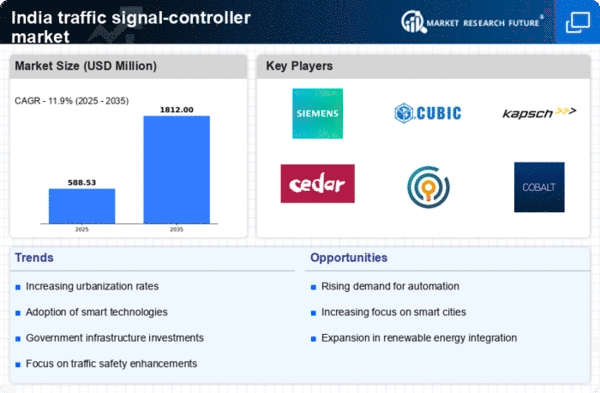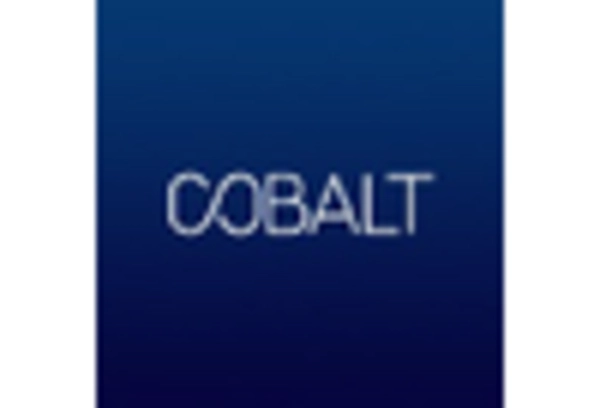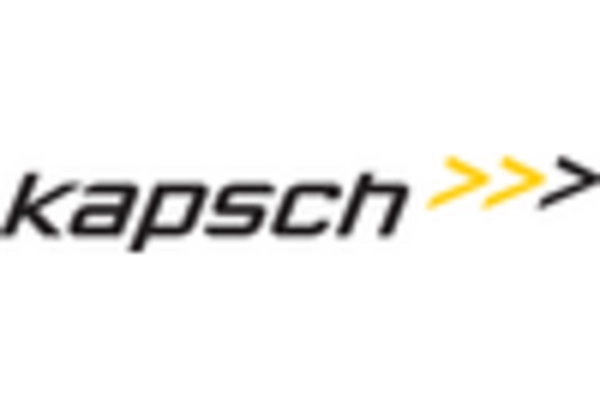Rising Road Safety Concerns
Rising road safety concerns are significantly impacting the traffic signal-controller market in India. With road traffic accidents being a leading cause of fatalities, there is an urgent need for effective traffic management solutions. The government has launched various campaigns aimed at improving road safety, which includes the installation of advanced traffic signal systems. According to the Ministry of Road Transport and Highways, over 150,000 fatalities occur annually due to road accidents, highlighting the critical need for enhanced traffic control measures. The traffic signal-controller market is likely to see increased demand as municipalities prioritize safety through the implementation of intelligent traffic systems. These systems can reduce accidents by optimizing traffic flow and ensuring timely signal changes. Consequently, the focus on road safety is expected to drive growth in the traffic signal-controller market as cities strive to create safer road environments.
Urbanization and Traffic Congestion
The rapid urbanization in India is a primary driver for the traffic signal-controller market. As cities expand, the volume of vehicles on the roads increases, leading to significant traffic congestion. According to government data, urban areas in India are expected to house over 600 million people by 2031, which will likely exacerbate traffic issues. This situation necessitates the implementation of advanced traffic signal systems to manage the flow of vehicles efficiently. The traffic signal-controller market is poised to benefit from this trend, as municipalities seek solutions to optimize traffic management and reduce congestion. Enhanced traffic signal systems can improve travel times and safety, making them essential for urban planning and development. Consequently, the demand for innovative traffic signal controllers is expected to rise, reflecting the urgent need for effective traffic management solutions in densely populated areas.
Government Investments in Infrastructure
Government investments in infrastructure development are a crucial driver for the traffic signal-controller market in India. The Indian government has allocated substantial funds for urban infrastructure projects, including road and traffic management systems. For instance, the Smart Cities Mission aims to enhance urban living through improved infrastructure, which includes upgrading traffic signal systems. This initiative is expected to inject over $1 billion into the traffic management sector, fostering the adoption of modern traffic signal controllers. Additionally, state governments are increasingly recognizing the need for efficient traffic management solutions to address urban mobility challenges. As a result, public-private partnerships are emerging, facilitating the development and deployment of advanced traffic signal systems. This trend indicates a robust growth trajectory for the traffic signal-controller market, driven by government support and investment in infrastructure.
Technological Advancements in Traffic Management
Technological advancements are significantly influencing the traffic signal-controller market in India. The integration of artificial intelligence (AI) and machine learning (ML) into traffic management systems is becoming increasingly prevalent. These technologies enable real-time data analysis, allowing for adaptive traffic signal control that responds to changing traffic conditions. Government initiatives are promoting the adoption of smart traffic solutions, which could lead to a market growth rate of approximately 15% annually. Furthermore, the deployment of Internet of Things (IoT) devices in traffic signal systems enhances connectivity and data sharing among various traffic management entities. This interconnectedness is crucial for developing efficient traffic flow strategies. As cities strive to modernize their infrastructure, the demand for advanced traffic signal controllers that leverage these technologies is likely to increase, driving growth in the traffic signal-controller market.
Environmental Regulations and Sustainability Initiatives
Environmental regulations and sustainability initiatives are emerging as key drivers for the traffic signal-controller market in India. The government is increasingly emphasizing the reduction of carbon emissions and promoting sustainable urban mobility solutions. As part of this effort, there is a growing demand for energy-efficient traffic signal systems that minimize energy consumption and reduce environmental impact. The traffic signal-controller market is likely to benefit from this trend, as municipalities seek to comply with environmental regulations and adopt greener technologies. For instance, the implementation of solar-powered traffic signals is gaining traction, aligning with the government's commitment to sustainability. This shift towards eco-friendly traffic management solutions could potentially lead to a market growth rate of around 10% over the next few years. As cities aim to enhance their sustainability profiles, the demand for innovative traffic signal controllers is expected to rise.
















